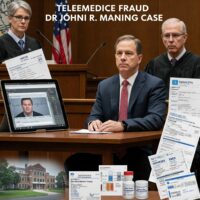Compounding Pharmacy, Two of Its Executives, and Private Equity Firm Agree to Pay $21.36 Million to Resolve False Claims Act Allegations
The Department of Justice announced today that compounding pharmacy Diabetic Care Rx LLC, or Patient Care America (PCA), PCA’s Chief Executive Officer Patrick Smith, PCA’s former Vice President of Operations Matthew Smith, and private equity firm Riordan, Lewis & Haden Inc. (RLH) have agreed to resolve a lawsuit alleging that they violated the False Claims Act through their involvement in a kickback scheme to generate referrals of prescriptions for expensive pain creams, scar creams, and vitamins, regardless of patient need, which were reimbursed by TRICARE, the federal health care program for military members and their families. PCA and RLH have agreed to pay $21,050,000, Patrick Smith has agreed to pay at least $300,000, and Matthew Smith has agreed to pay at least $12,788. These settlement amounts were based on defendants’ ability to pay.
“Kickback schemes taint decision-making and cause taxpayer-funded health care programs to pay for items or services that patients may not need,” said Assistant Attorney General Jody Hunt for the Department of Justice’s Civil Division. “We will hold accountable health care providers involved in such schemes designed to induce referrals of prescriptions that are reimbursed by federal health care programs.”
“The prosecution and resolution of this case demonstrates the U.S. Attorney’s Office continuing commitment to hold all responsible parties to account for the submission of claims to federal health care programs that are tainted by unlawful kickback arrangements,” said United States Attorney Ariana Fajardo Orshan. “Kickback schemes lead to unnecessary medical services and drive up the cost of health care for all.”
“This settlement sends a clear message about the Defense Criminal Investigation Service (DCIS) and its law enforcement partners’ unwavering commitment to protect the integrity of TRICARE, the Department of Defense’s health care program which serves to protect our U.S. military, their family members, and military retirees,” said Special Agent in Charge Cyndy Bruce of the DCIS Southeast Field Office. “Health care providers who manipulate and abuse the TRICARE program in order to seek financial gain by submitting false claims and demonstrating a lack of regard for TRICARE patients and the health care plan which is charged to provide their medical care, will be diligently investigated and held accountable for their actions.”
This settlement resolves a lawsuit pursued by the United States against PCA for allegedly paying kickbacks to outside “marketers” to target military members and their families for prescriptions for compounded creams and vitamins, which were formulated to ensure the highest possible reimbursement from TRICARE. The United States alleged that the marketers paid telemedicine doctors who prescribed the creams and vitamins without seeing the patients, or in some cases, even speaking to them. The settlement also resolves the United States’ allegations that PCA and a marketer routinely jointly paid the copayments owed by patients referred by the marketer, without any verification of the patients’ financial needs, and then disguised the payments as coming from a sham charitable organization, which was affiliated with the marketer. Finally, the settlement resolves the United States’ allegations that PCA continued to claim reimbursement for prescriptions referred by the marketers despite regularly receiving complaints from patients that revealed the prescriptions were being generated without patient consent or a valid patient-prescriber relationship. RLH, the private equity firm that managed PCA on behalf of its investors, allegedly knew of and agreed to the plan to pay outside marketers to generate the prescriptions and financed the kickback payments to the marketers. Patrick Smith and Matthew Smith were executives of PCA who allegedly executed the scheme.
The lawsuit resolved by the settlement was originally filed under the whistleblower (or “qui tam”) provisions of the False Claims Act by Marisela Medrano and Ada Lopez, two former employees of PCA. The qui tam provisions permit private individuals to sue on behalf of the government for false claims and to share in any recovery. The False Claims Act authorizes the United States to intervene and take over such lawsuits, which the United States did here, in part. The share to be awarded in this case has not been determined yet.
This civil settlement was the result of a coordinated effort by the Civil Division’s Commercial Litigation Branch (Fraud Section), the United States Attorney’s Office for the Southern District of Florida, the Defense Criminal Investigative Service, and the U.S. Food & Drug Administration’s Office of Criminal Investigations.
The lawsuit is captioned United States ex rel. Medrano and Lopez v. Diabetic Care Rx LLC, d/b/a Patient Care America, et al., No. 15-CV-62617 (S.D. Fla.). The claims resolved by the settlement are allegations only and there has been no determination of liability.












